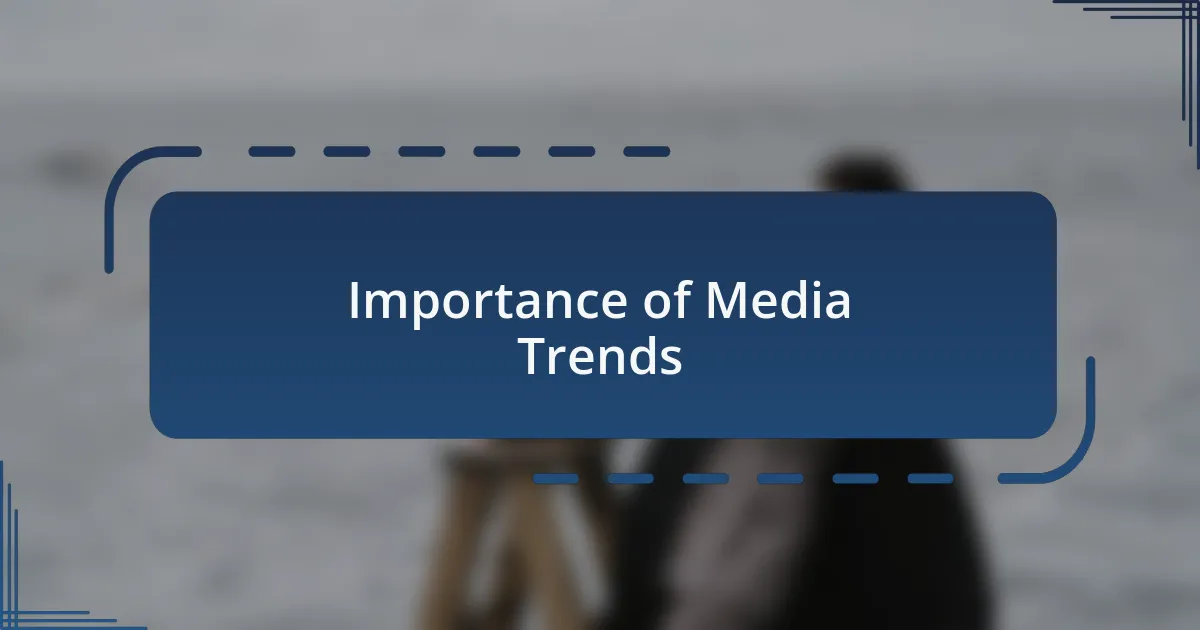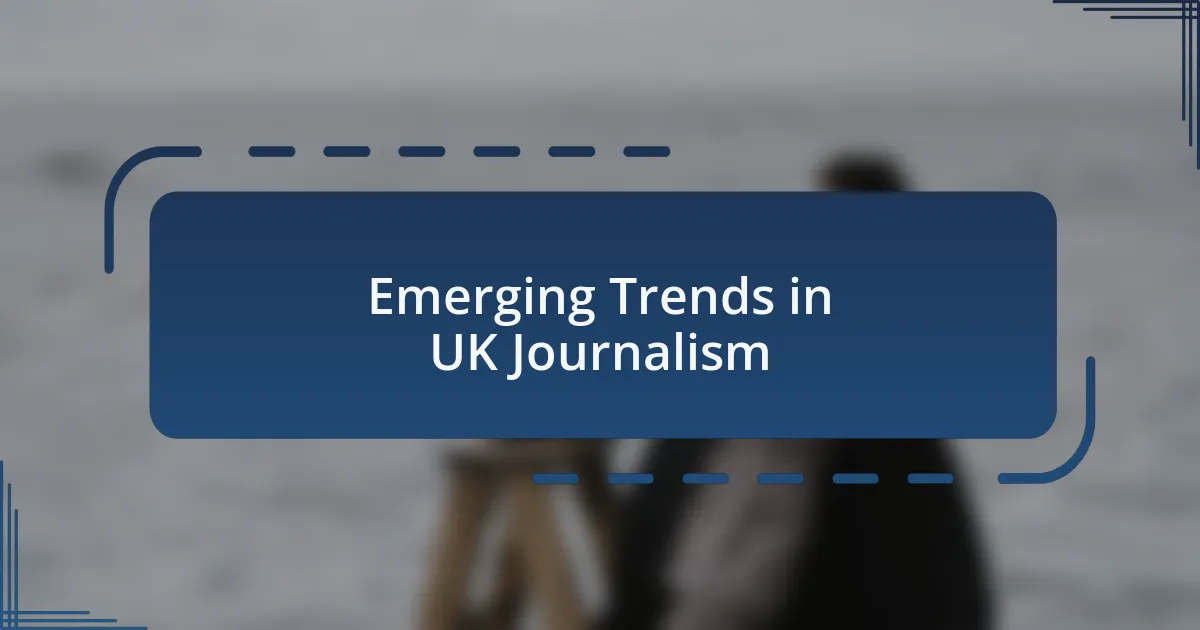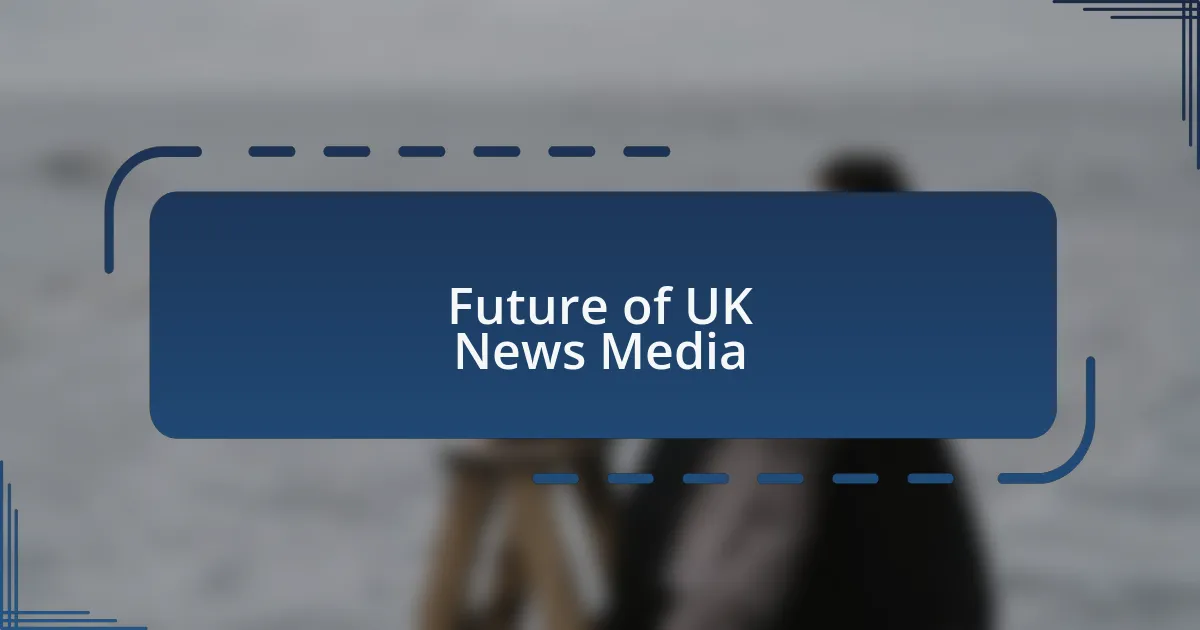Key takeaways:
- The UK news media landscape is evolving rapidly, with a notable shift towards digital platforms and the influence of social media personalities on public opinion.
- Local journalism is regaining significance as a key driver of community engagement, emphasizing the need for authentic and meaningful storytelling.
- Emerging trends highlight the importance of media literacy and combating misinformation, alongside a growing focus on sustainable journalism and environmental accountability.
- The future of UK news will likely focus on balancing technological advancements, like AI, with the preservation of human nuance and community-oriented reporting.

Overview of UK News Media
The UK News Media landscape is a rich tapestry woven from a variety of sources, ranging from traditional newspapers to digital news platforms. Personally, I often find myself captivated by the relentless pace at which news evolves here. It’s fascinating to think: how much has our consumption of news transformed over just the last decade?
In my experience, the significance of local journalism often goes underappreciated. Local newspapers provide not just news but a sense of community and connection. I remember picking up my local paper and feeling a genuine connection to my neighborhood; that feeling seems irreplaceable amidst the digital age’s overpowering influence.
Furthermore, the role of regulation in UK news media can’t be understated. Bodies like Ofcom help ensure a level of accountability that I believe is crucial. It’s interesting to ponder whether strict regulations truly safeguard journalistic integrity or if they stifle creativity and innovation.

Importance of Media Trends
Understanding media trends is crucial as they shape public perception and influence societal dialogue. Reflecting on my own experiences, I’ve noticed how trending topics can shift dramatically, affecting how stories are packaged and presented. For instance, when environmental issues gained popularity in media, it sparked a surge in coverage that made it hard to ignore the urgency of climate change. Have you ever felt a passionate topic resonate across various platforms, altering discussions in your circles?
Media trends also serve as a barometer for societal values and changes. I often think about how movements like #MeToo or Black Lives Matter have reshaped narratives in the press. Seeing these trends in action, I felt a surge of hope; they signal to me that our media can be a powerful tool for advocacy and catalyst for real change, pushing important conversations into the mainstream.
Moreover, the evolution of media consumption—driven by technology and social media—highlights the importance of adaptability in journalism. I recall how I had to adjust my news diet when podcasts became popular; now, they’re my go-to source for in-depth analysis. Isn’t it fascinating how these platforms cater to our ever-changing habits, reflecting our need for convenience while still seeking depth? The ability to stay ahead of these trends is essential for media outlets to remain relevant and engaged with their audience.

Key Influencers in UK Media
One of the most significant key influencers in UK media today is the rise of social media personalities. I often find myself captivated by how figures like influencers and content creators shape news narratives, especially among younger audiences. Their ability to command attention and create dialogues often leaves traditional media outlets scrambling to keep up. Have you ever noticed how a trending TikTok video can overshadow a major news report? It reflects a shift in authority, where these influencers wield considerable power over public opinion.
Another notable influencer is the BBC, which has long been a cornerstone of UK media. I remember growing up with BBC News as my primary source of information, and its role continues to evolve. The challenge it now faces is to maintain impartiality while also engaging diverse audiences in an increasingly fragmented media landscape. How does one preserve a legacy while embracing digital innovation? The answer lies in being versatile and embracing change while sticking to core journalistic values.
Lastly, media owners and executives play a pivotal role in shaping the direction of UK media. I’ve seen firsthand how decisions made behind closed doors can affect content distribution and editorial independence. This often leads me to ponder: to what extent are journalists free to report the truth when faced with corporate interests? It’s a complex dynamic that influences not just what we see in the news, but how we perceive the world around us.

Impact of Technology on News
The influence of technology on news delivery is profound and ever-evolving. I recall the thrill of breaking news alerts on my phone; it’s surreal how a single notification can pull me into a major story instantly. This immediacy adds urgency but also raises questions about accuracy. How can we trust that what we read online is verified when it spreads like wildfire?
The rise of artificial intelligence in newsrooms is also a stark reality. I’ve seen and even interacted with news bots that curate stories for me based on my interests. It’s fascinating but somewhat unsettling to think that algorithms are influencing not just what news I receive, but how it’s presented. Are we losing the human touch in storytelling?
Moreover, the emergence of mobile journalism has transformed how stories are captured and shared. I often reflect on how, during a recent event, citizen journalists were able to report live using just their smartphones. This democratization of reporting is thrilling, but it poses a challenge for traditional outlets: how do they reclaim authority in an age where anyone with a device can be a reporter? It’s a complex landscape that keeps me engaged and questioning the future of news.

Emerging Trends in UK Journalism
Emerging trends in UK journalism are increasingly shaped by the demand for authenticity and personal connection. During my last conversation with a journalist friend, we discussed the growing popularity of long-form journalism, where in-depth stories allow for a more nuanced exploration of issues. It’s refreshing to see that readers crave substance, seeking out narratives that resonate on a personal level rather than a barrage of headlines.
Another fascinating trend is the rise of local journalism, particularly in digital spaces. I remember attending a community event where a local news outlet was live-tweeting updates, capturing the immediacy of the moment. It dawned on me how pivotal local journalism is in driving engagement, as it fosters a sense of community and accountability that larger outlets often overlook. Can local news become the bedrock of trust in journalism once again?
Additionally, the growing emphasis on data journalism is hard to ignore. I recently delved into a series of investigative pieces that brilliantly used data to uncover trends affecting local populations. The ability to present complex information visually not only enhances storytelling but also fosters transparency. Isn’t it powerful to see data lead the way in shaping our understanding of societal issues? This evolution in journalism gives me hope for a future where clarity and informed discourse reign.

My Personal Insights on Trends
One trend that genuinely captivates me is the shift towards interactive and immersive storytelling. I once experienced a virtual reality news piece that transported me into the heart of a protest, allowing me to feel the energy and urgency of the moment. It made me question: can technology truly bridge the emotional gap between events happening worldwide and our everyday lives? I believe it can, creating visceral connections that static articles simply can’t achieve.
Another observation is the persistent challenge of misinformation, which continues to plague our media landscape. During a recent debate in my book club, we grappled with how to discern credible sources amidst a sea of false narratives. As someone who values trust in journalism, I find it alarming and motivating; the responsibility now lies with both journalists and readers to cultivate media literacy. How do we empower ourselves to become discerning consumers of information in this complex digital age?
Lastly, I’ve noticed a growing trend towards sustainable journalism, where environmental accountability is becoming central to reporting. I personally attended campaigns focused on climate reporting, where journalists showcased not just the issues but also viable solutions. This proactive approach resonates with me, as it emphasizes journalism’s role in fostering informed activism. Isn’t it encouraging to think that our media can inspire change rather than just report on despair?

Future of UK News Media
The future of UK news media looks increasingly digital, and I can’t help but feel a mix of excitement and concern. With the rise of AI-generated content, I wonder how traditional journalism will adapt. When I attended a recent industry panel, the debate was lively; can algorithms replicate human nuance and empathy in storytelling? I believe the challenge will be to maintain authenticity while embracing technological advancements.
Moreover, the integration of user-generated content is reshaping how news is created and consumed. Participating in local community forums has shown me how people are eager to share their experiences, but it raises the question: how do we verify these contributions? It’s crucial for established media outlets to find a balance between encouraging public participation and ensuring accurate reporting, lest they contribute to the very misinformation they aim to combat.
Finally, I see a growing emphasis on local journalism as a cornerstone of community engagement. Recently, I subscribed to a local news service, and the impact has been profound; stories that matter to my neighborhood now take center stage. This approach makes me think: could the revival of local news be the antidote to the challenges facing larger media? If communities invest in their own narratives, it not only fosters a sense of belonging but also strengthens democratic discourse.